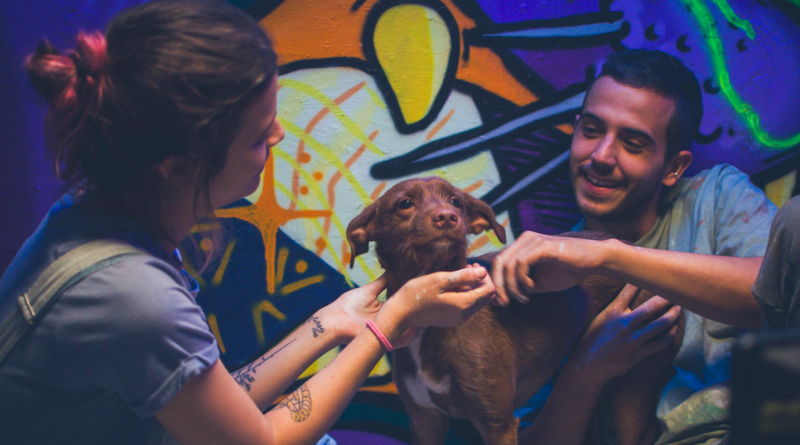INTERVIEW: ‘Days of the Whale’ explores street art scene in Medellín, Colombia
Photo: Days of the Whale stars Laura Tobón and David Escallón. Photo courtesy of Outsider Pictures / Provided by Cinema Tropical with permission.
Director Catalina Arroyave’s debut feature, Days of the Whale, depicts the lives of two graffiti artists in Medellín, Colombia, one of the largest metropolitan areas in the country and a city looking forward to a better, safer future after its violent past.
In the movie, newcomer actors Laura Tobón and David Escallón play Cristina and Simon, respectively. The two are friends and fellow artists, but they have different background that greatly impact their lives and work. Simon is from a working-class family and has been raised by his grandmother, while Cristina is from a wealthier upbringing and lives alone with her father (her mother, a journalist, had to flee the country), according to press notes.
The two live their life and make their art without too much trouble or cares in the world, but their fate takes a turn when they decide to paint a mural over a local gang’s tag. In some ways, Cristina and Simon, representing the hope for the future, must deal with the city’s past — head on and weary of the consequences.
“Well, the project started in 2014,” Arroyave said in a phone interview last year. “I was actually writing a short film, and I was very interested in talking about growing up being a woman in a city like mine, in Medellín. This also came together with the fact that I was working as an AD [assistant director] in short films and movies, and I was coming across this territorial control that’s going on in our city. I thought it was something that I really strongly wanted and needed to talk about. These two things came together and also the fact that I’m friends with a very talented muralist and graffiti artist of the city. These three obsessions started mixing up in my head, and I decided to write Days of the Whale.”
The director had a strict budget for the making of the film. They were using money from the Colombia government funds, and there was a limited amount for the shoot and post-production.
“We had to adjust our schedule and our shooting to the time that we could have with that specific amount of money,” she said. “Plus at the beginning I thought the movie wasn’t going to be very expensive because it was centered on two characters. The other atmospheres that we were re-creating were realistic, so I thought we weren’t going to have to spend a lot of money. … But of course you start wanting to do more and more. For example, for the murals we had to design and create all of that.”
Still, despite the strict spending schedule, Arroyave surrounded herself with highly qualified crew members who were the epitome of professionalism. They were able to lens the feature in only four weeks, and they overcame any obstacles thrown their way — whether weather, shooting outdoors, live animals, child actors, painting, etc.
What Tobón and Escallón are able to achieve in the film is remarkable, especially since it’s the first feature for both of them. To help the actors with the process, the director put them through an instructive boot camp on the art of acting.
“They didn’t have any training in acting,” the filmmaker said. “They’re non-actors. I chose them because I found these two wonderful, perfect human beings who could represent the characters that I had imagined. The process of working with them was wonderful, absolutely magnificent. We had a three-month training period in which they prepared to be actors and graffiti artists, and they learned how to develop a code and a character that was exactly them. I thought it was a wonderful experience. I learned a lot from them. I’m still learning a lot from them because they are very honest, very powerful human beings. That was one of my favorite parts of the process.”
Days of the Whale, which premiered at last year’s SXSW festival and is now available virtually, represents yet another strong and effective film that has traveled from Colombia to the United States marketplace. For Arroyave, her film and others in recent years are part of a larger movement from her country and her city of Medellín. It’s a renaissance, with no end in sight.
“I absolutely think I’m part of something,” she said. “I’m part of a very strong creative movement that’s going on in our city nowadays. … I believe there’s a movement, that it’s growing in terms of narrative strength and also we’re trying to get to a broader amount of points of views of our city. Medellin has been sub-represented. We have seen it through only a few visions, so now there’s a broader landscape of voices and of ways of looking at the city and ways of looking at Colombia.”
Arroyave added: “We’re helping each other. We’re not working alone. We’re trying to support others that are coming and that are starting to be filmmakers. We’re trying to share the information that we have and share the know-how and share the resources and difficult circumstances when the movies become hard. We’re there for each other. I believe I am part of a movement, and it’s actually based on the idea of having films made with friends, with your friends, with people you trust and people you love. That makes it a prettier and more interesting experience, I think, and enriching.”
By John Soltes / Publisher / John@HollywoodSoapbox.com
Days of the Whale, directed by Catalina Arroyave, is now available virtually from Outsider Pictures. Click here for more information.

